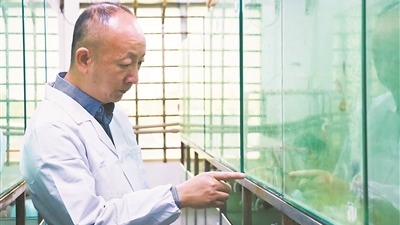
Wu Xiaoyi observing the growth of fish fry in laboratory
On October 8, Science and Technology Daily reporter walked into the breeding room 101 of the School of Marine Sciences, Hainan University, and saw several spotted groupers swimming back and forth in the fish tank.
In the past 10 years, Professor Wu Xiaoyi and his research team have overcome numerous difficulties in order to realize intensive aquaculture of groupers.
“Relying on our own strength to hold steady China’s rice bowl”
Hainan Island is surrounded by sea and is rich in marine biological resources. As an excellent tropical seafood species, grouper tastes delicious and has a large market demand. However, its large-scale and intensive aquaculture faces many challenges.
To realize ecological and intensive aquaculture, the development of nutritionally balanced feed with a low fishmeal content is the key. Fishmeal, with its high nutritional value, is the main feed ingredient for grouper farming, but the supply of fishmeal in China depends to a large extent on imports.
“We must rely on our own strength to hold steady China’s rice bowl and bring more abundant seafood to people’s dining tables.” Wu said that, to reduce dependence on imports, we need to reduce the content of fishmeal in grouper feed as much as possible.
To this end, Wu Xiaoyi’s scientific research team conducted in-depth and systematic research on grouper nutrition and functional feed, and united with five other institutions to carry out technological research to reduce fishmeal content in grouper feed from 70% to 20%.
“In the past 10 years, our team has not only built a database of the basic nutritional requirement parameters, but also created a technical system of feed proportioning based on terrestrial protein sources and biogenetic engineering products, and reduced fishmeal content in grouper feed. In addition, we have added Chinese herbs such as dandelion and ginkgo biloba to the feed to improve the immunity of grouper.” Wu introduced.
With this achievement, Wu Xiaoyi’s research team won the first prize of the 2021 Hainan Science and Technology Progress Award. Relevant research results have been published in Aquaculture and British Journal of Nutrition and other academic journals.
“Scientific research cannot be divorced from the needs of economic and social development”
“Scientific research cannot be self-enclosed and separated from the needs of economic and social development.” “Ten years ago, although the scientific research conditions were limited, with the strong support of Hainan University, we seized the opportunity of cooperation between the university and the local community, and established a cooperative relationship with grouper breeding enterprise in Changjiang Li Autonomous County, Hainan Province.” Wu said.
Today, based on a number of scientific research results in grouper nutrition, Wu Xiaoyi’s scientific research team has established stable cooperative relationships with enterprises in and outside Hainan Province. The transformation of the relevant results has not only improved the economic effects of these enterprises, but also driven the employment of neighboring farmers, resulting in good social benefits.
According to Zhang Jinfeng, a member of Wu Xiaoyi’s scientific research team, Wu is an amiable and patient teacher. He recalled to the reporter that when the COVID-19 epidemic was raging, team members could not leave dormitory due to the closed management of the university, but the research project could not be interrupted, and the fry in the laboratory needed to be fed. Wu went to the lab by himself three times a day, in the morning, in the middle of the day and in the evening, to complete a whole set of work, from feeding fish and shrimp, preparing feed to cleaning the breeding system.
“Mr. Wu’s obsession with and perseverance in aquatic research are greatly admired by the whole team.” Zhang Jinfeng said that it is with such spirit of dedication that the team has achieved today’s results.
Achievements belong to the past. Looking forward to the future, Wu has a higher goal.
“Our research team hopes to reduce the cost of grouper breeding through scientific and technological innovation, so that ordinary people can get real benefits.” “In the future, we will continue to plough into the ‘blue granary’, and work with industry peers to build a high-quality, cost-effective and branded grouper aquaculture industry, and bring grouper to more people’s tables,” he told reporters.